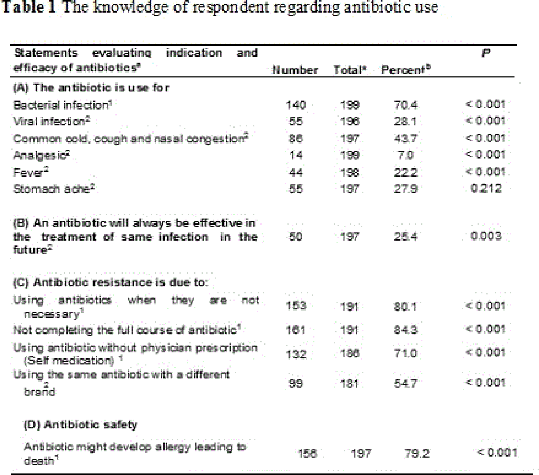| 211P London, UK Pharmacology 2017 |
A cross sectional survey assessing the knowledge attitudes and practices of antibiotic use among medical students in Jordan
Introduction: Emergence of antibiotic resistant strains is becoming a worldwide public health problem. Irrational antibiotic use among the public has been reported in literature. The aim of the present study was to assess the knowledge attitudes and practices of antibiotic use among university medical students at The University of Jordan.
Method: The study was carried out during the month of November 2010. A cross-sectional, questionnaire-based survey involving medical students (n=200) at The University of Jordan was conducted. A structured questionnaire was developed by reviewing relevant literature (You et al., 2008; McNulty et al., 2007). An expert committee revised and validated the questionnaire and tailored it to the Jordanian setting. Furthermore, it was field-tested several times on a pilot sample of 10 students (5% of the target sample) to clarify any ambiguities. The questionnaire comprised a total of 31 questions and was handed to students at the beginning of different classes. Completed anonymized questionnaire were returned at the end of the class. All data were coded and analyzed using Statistical Package for Social Sciences program (SPSS), version 16.0.
Results: Out of the 200 questionnaires distributed, 199 were returned (response rate = 99.5%). Scoring level analysis revealed insufficient knowledge, high consumption rates and self-medication as shown in table 1.
Conclusion: Misapprehension in terms of knowledge, attitude and practice of antibiotics use among medical students were observed. Therefore, it is important to incorporate more courses on antibiotics proper use into medical colleges’ curriculum and to conduct follow up studies to ensure that goals have been fulfilled regarding improper use, over prescription of antibiotics and its association with resistance. Moreover, adopting strict policies that enforce regulations regarding procurement of antibiotics prohibit their purchase without prescription and controlling over the counter sale is a necessity. This will result in reduction of self-medication and high rates of consumption. Furthermore, consultation strategies and guidelines which improve antibiotic policies and procedures should be followed.
References:
1. McNulty et al. (2007). J. Antimicrob. Chemother., 60: I63-I68.
2. Sawair FA et al. (2009). Med. Princ. Pract., 18: 5-21.
3. You JHSet al. (2008). Infection, 36: 153-157.


